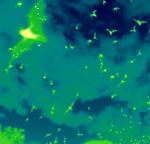2009 University Lecture
Aeroecology: The Next Frontier
 Presented by Thomas H. Kunz
Presented by Thomas H. Kunz
Monday, October 19, 2009 at 7:00 pm
Tsai Performance Center
685 Commonwealth Avenue
Boston, Massachusetts
 Thomas H. Kunz is Professor of Biology, and Director of the Center for Ecology and Conservation Biology at Boston University. His research focuses on the ecology, behavior, evolution, and conservation biology of bats. He is the author or co-author of over 240 peer-reviewed publications and is the editor of Ecology of Bats (Plenum Press, 1982) and Ecological and Behavioral Methods for the Study of Bats (Smithsonian Institution Press, 1988); and co-editor of Bat Biology and Conservation (Smithsonian Institution Press, 1998), Bat Ecology (University of Chicago Press, 2003), Functional and Evolutionary Ecology of Bats (Oxford University Press, 2006), and the 2nd edition of Ecological and Behavioral Methods for the Study of Bats (Johns Hopkins University Press, 2009). He is an elected Fellow of the American Association for the Advancement of Science, Past-President of the American Society of Mammalogists, and a recipient of the Gerrit S. Miller Jr. Award for outstanding research on bats and the C. Hart Merriam Award for outstanding research in mammalogy. He was the 2008 recipient of a lifetime achievement award from the Karst Waters Institute, and was elected to honorary membership in the American Society of Mammalogists (the highest award given by the Society). Most of his past and current research has been funded by grants from the National Science Foundation. His current work focuses on the analysis of collective behavior of bats, assessing the ecological and economic impact of Brazilian free-tailed bats on agroecosystems, assessing the impacts of wind-energy development on bats, and assessing the effects of White-Nose Syndrome on hibernating bats – a disease that has led to the most precipitous decline of bat populations in recorded history. He has conducted field research in North America, Costa Rica, Ecuador, India, Malaysia, and the West Indies. He is the founding co-director of the Tiputini Biodiversity Station in eastern Ecuador.
Thomas H. Kunz is Professor of Biology, and Director of the Center for Ecology and Conservation Biology at Boston University. His research focuses on the ecology, behavior, evolution, and conservation biology of bats. He is the author or co-author of over 240 peer-reviewed publications and is the editor of Ecology of Bats (Plenum Press, 1982) and Ecological and Behavioral Methods for the Study of Bats (Smithsonian Institution Press, 1988); and co-editor of Bat Biology and Conservation (Smithsonian Institution Press, 1998), Bat Ecology (University of Chicago Press, 2003), Functional and Evolutionary Ecology of Bats (Oxford University Press, 2006), and the 2nd edition of Ecological and Behavioral Methods for the Study of Bats (Johns Hopkins University Press, 2009). He is an elected Fellow of the American Association for the Advancement of Science, Past-President of the American Society of Mammalogists, and a recipient of the Gerrit S. Miller Jr. Award for outstanding research on bats and the C. Hart Merriam Award for outstanding research in mammalogy. He was the 2008 recipient of a lifetime achievement award from the Karst Waters Institute, and was elected to honorary membership in the American Society of Mammalogists (the highest award given by the Society). Most of his past and current research has been funded by grants from the National Science Foundation. His current work focuses on the analysis of collective behavior of bats, assessing the ecological and economic impact of Brazilian free-tailed bats on agroecosystems, assessing the impacts of wind-energy development on bats, and assessing the effects of White-Nose Syndrome on hibernating bats – a disease that has led to the most precipitous decline of bat populations in recorded history. He has conducted field research in North America, Costa Rica, Ecuador, India, Malaysia, and the West Indies. He is the founding co-director of the Tiputini Biodiversity Station in eastern Ecuador.
Website: www.bu.edu/cecb
